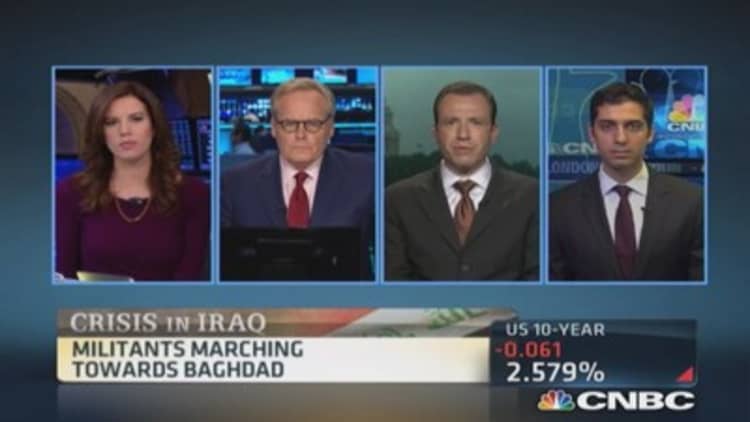President Barack Obama faces mounting pressure to increase U.S. assistance to Iraq, including with military force, as militant rebels capture more territory and threaten the government in Baghdad.
At a meeting with Australian Prime Minister Tony Abbott, Obama said: "I'm not ruling out anything" to prevent jihadists from destabilizing Iraq and the Middle East more broadly. He added that the U.S. retains the right to strike militarily, unilaterally if necessary, if its national security interests are threatened.
Although he called the situation a near-term "emergency," the president did not say it currently threatens U.S. security interests and gave no indication that airstrikes on rebel forces are imminent. Later at his daily briefing, White House Press Secretary Jay Carney said there was no consideration to use U.S. ground troops. He noted there were other ways of helping Iraqi security forces militarily, including with equipment.
Among those pressing for a more robust response is House Speaker John Boehner. At a news conference Thursday, Boehner derided the president for "taking a nap" amid the crisis. Calling the fate of Iraq "clearly in jeopardy," he called on the White House to "get engaged before it's too late."
Read More Pres. Obama: 'I don't rule out anything' when it comes to helping Iraq
The issue is especially troublesome for Obama because of his opposition to the Iraq War since the possibility of military action first arose during President George W. Bush's administration after the 9/11 attacks. Obama ran for president in 2008 on a promise to end the war.

In office, he ended the U.S. combat mission there, as he now pledges to do so in Afghanistan by the end of this year. Both positions are popular with a war-weary American public.
Read MoreKey facts about the group wreaking havoc in Iraq
Yet mounting violence, in Iraq and across its western border in Syria, could unsettle the broader Middle East enough to threaten America's economic and national security interests. Even though the administration claims success in decimating the core of al-Qaeda itself, the militants advancing in Iraq are linked to al-Qaeda. Kenneth Pollack, a former national security aide to President Bill Clinton, wrote this week in The Wall Street Journal, "Every postwar American recession has been preceded by an increase in oil prices, often the result of Middle East instability."
The acceleration of violence in recent days means Obama may have to decide sooner rather than later on potential use of U.S. military forces or assets. Asked Thursday whether Iraq is "coming apart," Secretary of State John Kerry called the U.S. "deeply concerned."
Read MoreArt Cashin: Iraq uprising is 'quite dangerous'
"We are in direct touch with Prime Minister Maliki, with leaders at the top level," Kerry told reporters. "I've just completed phone calls now with people in Iraq. I know the president is prepared to make key decisions in short order."
—By CNBC's John Harwood


